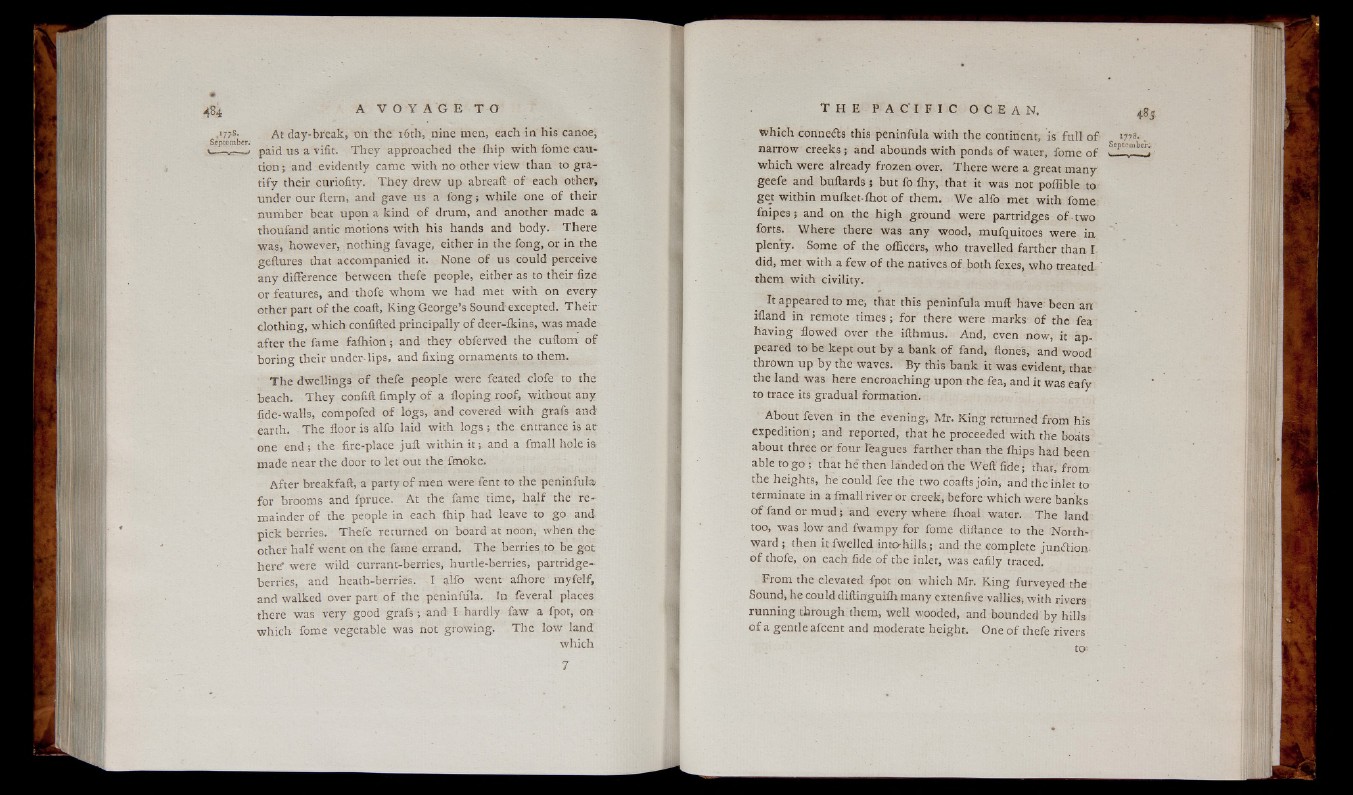
,1778. At day-break, on the 16th, nine men, each in his canoe,
paid us a vifit. T h e y approached the ihip with fome caution
; and evidently came with no other v iew than to gratify
their curiofity. T h e y drew up abreaft o f each other,
under our ftern, and gave us a fo n g ; while one o f their
number beat upon a kind o f drum, and another made a
thoufand antic motions w ith his hands and body. The re
was, however, nothing favage, either in the fong, or in the
geftures that accompanied it. None o f us could perceive
any difference between thefe people, either as to their fize
or features, and thofe whom we had met with on every
other part o f the coaft, K in g George’s Sound excepted. T h e ir
clothing, which confifted principally o f deer-fkins, was made
after the fame fa ffiio n ; and they obferved the cuftom o f
boring their under-lips, and fixing ornaments to them.
T h e dwellings o f thefe people were feated clofe to the
beach. T h e y confift limply o f a Hoping roof, without any
fide-walls, compofed o f logs, and covered with grafs and
earth. T he floor is alfo laid with logs ; the entrance is atr
one en d ; the fire-place juft within i t ; and a fmall hole is.
made near the door to let out the fmoke.
A fter breakfaft, a party o f men were fent to the peninfula
for brooms and fpruce. At the fame time, h a lf the re mainder
o f the people in each ihip had leave to go and
p ick berries. T he fe returned on board at noon, when the
other h a lf went on the fame errand. The berries to be go t
here- were wild currant-berries, hurtle-berries, partridge-
berries, and heath-berries, I alfo went alhore m y felf,
and walked over part o f the peninfula. In feveral places
there was very good g r a f s ; and I hardly faw a fpot, on
w hich fome vegetable was not growing. T h e low land
which
w h ich connects this peninfula w ith the continent, is fu ll o f
narrow c r e e k s ;• and abounds with ponds o f water, fome o f
w hich were already frozen over. The re were a great many
geefe and buftards ; but fo Ihy, that it was not polfible to
g e t within muiket-fliot o f them. We alfo met with fome;
fn ip e s ; and on the h ig h ground were partridges o f-tw o
forts. Where there was any wood, mufquitoes were in
plenty. Some o f the officers, who travelled farther than I
did, met with a few o f the natives o f both fexes, who treated-
them with civ ility .
It appeared to me, that this peninfula mull have been an
ifland in remote t im e s ; for there were marks o f the fea
ha vin g flowed over the ifthmus. And, even now, it appeared
to be kept out by a bank o f fand, ftone's, and wood
thrown up b y the waves. By this bank it was evident, that
the land was here encroaching upon the fea, and it was eafy
to trace its gradual formation.
About feven in the evening, Mr. K in g returned from his
expedition ; and reported, that he proceeded with the boats
about three or four Teagues farther than the ffiips had been •
able to go ; that he then landed on the Weft fide; that, from
the heights, he could fee the two coafts join, and the inlet to
terminate in a fmall river or creek, before which were banks
o f fand or m u d ; and every where ffioal water. T h e land
too, was low and fwampy for fome diftance to the Northw
a rd ; then it fwelled into-hills; and the complete juniftion.
o f thofe, on each fide o f the inlet, was eafily traced.
From the elevated fpot on which Mr. Kin g furveyed the
Sound, he could diftinguiffi m any extenfive vallies, with rivers
running through them, well wooded, and bounded by hills
o f a gentle afcent and moderate height. One o f thefe rivers
to: